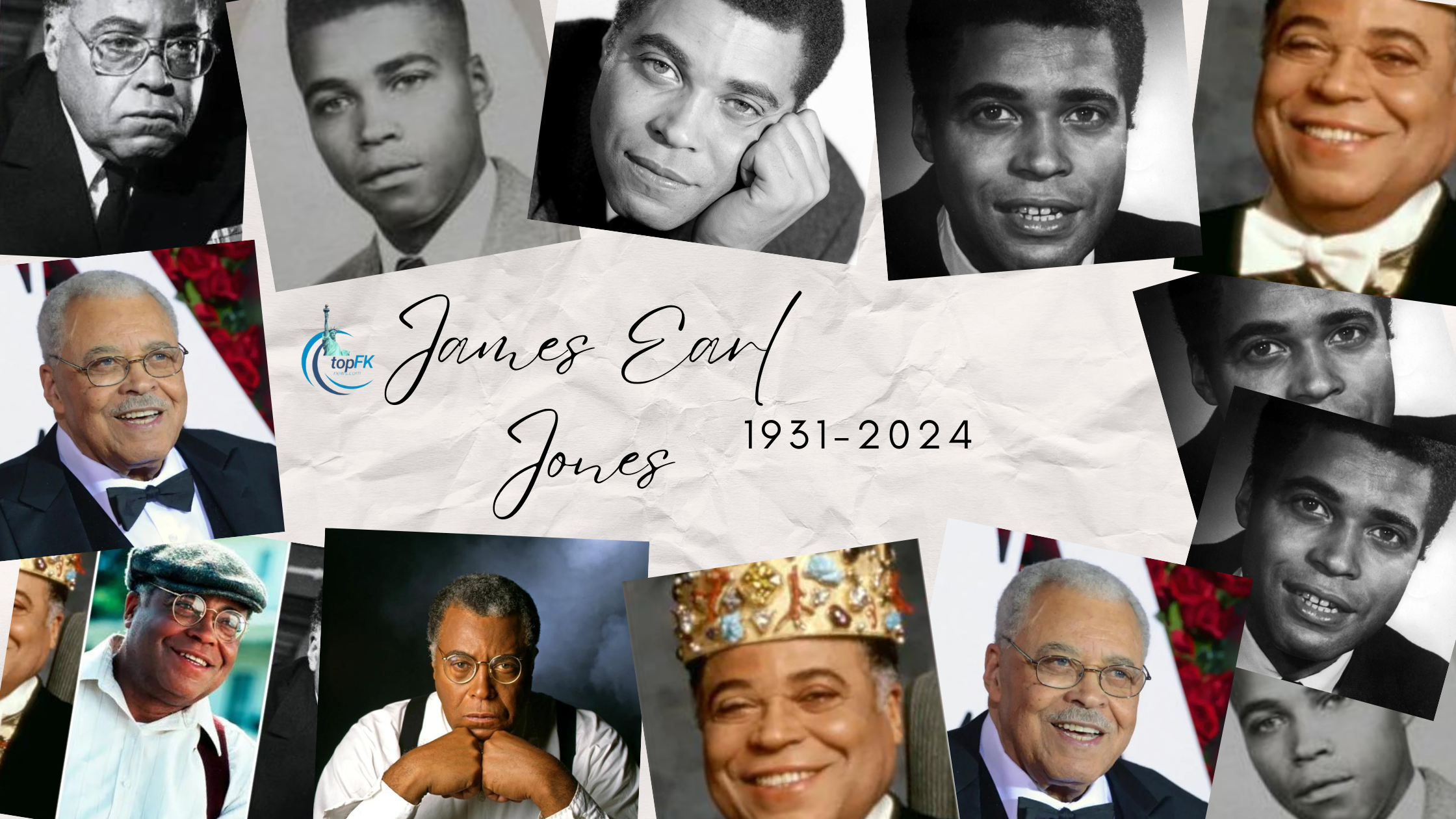Actor James Earl Jones, known for his strong voice and charisma, died away at his home in Dutchess County, New York, at the age of 93. Jones made an unforgettable impression on American entertainment with his multi-genre performances that tackled weighty topics like racial relations and Shakespearean tragedy. The story of his rise to fame is one of perseverance, skill, and doggedness; it begins with him as a stuttering farm kid.
Beginnings and Challenges
Young James Earl Jones, who was born on January 17, 1931, in Arkabutla, Mississippi, endured the trauma of abandonment. Grandparents reared him on a Michigan farm after his parents, Robert Earl and Ruth Connolly Jones, split when he was a little boy. His emotionally scarred childhood, compounded by his grandmother’s racial animosity, would affect him for the better part of his life.
Jones was mute for a while due to a severe stutter he got when he was a kid. These years were very tough for him because of his solitude, loneliness, and dissatisfaction with his communication difficulties. Jones, on the other hand, was encouraged to write poetry by his high school English instructor Donald Crouch, who saw potential in him. Graduating from high school, Jones had mostly conquered his speech impairment, which he had gradually restored. Because of this, he became an intense study of language and its connotations, which influenced his approach to acting.
Conquering Obstacles
James Earl Jones attended the University of Michigan, where she changed her major from pre-med to acting. Although he had a rocky start to his acting career while in university, he eventually found his footing. Although he joined the Army as part of his ROTC commitment, he only gave military service a cursory thought before deciding to follow his heart in 1955 and resigning his command.
Jones had a lot of trouble making ends meet after relocating to New York. Making ends meet was a strain for him as he performed odd jobs and lived in a cold-water apartment that cost $19 a month. In spite of all these obstacles, he was hell-bent on succeeding. Finally, after much effort, he was accepted into Lee Strasberg’s Actors Studio and the American Theater Wing, where he continued to refine his skill.
A Path to Acting
James Earl Jones joined Joseph Papp’s New York Shakespeare Festival in the early 1960s, when he started to find work in theater. His portrayals in timeless dramas like “Henry V,” “Romeo and Juliet,” and “A Midsummer Night’s Dream” brought him immediate renown. However, his 1964 performance as Othello solidified his reputation as an accomplished actor. He quickly became a fixture in the New York theater scene, captivating audiences with his powerful voice and commanding stage presence.
Small but significant parts were Jones’s early cinematic appearances, such as the bombardier in Stanley Kubrick’s 1964 satire “Dr. Strangelove.” But it was his 1970 performance as Jack Jefferson in The Great White Hope—an adaptation of the life story of the first Black heavyweight boxing champion, Jack Johnson—that made him famous. Jones was nominated for an Oscar for his role in the 1968 Broadway production of the show, and he won a Tony Award for his performance.
Recognized Positions and Major Achievements
Unlike other Hollywood stars, James Earl Jones wasn’t placed in typical leading-man parts despite his early achievements. Shakespearean monarchs and common folk alike were no match for his deep, booming voice and Everyman image. Because of his adaptability, he became a top performer in both film and theater.
James Earl Jones had a major influence on television in addition to his theatrical and cinematic efforts. With his roles as a doctor on The Guiding Light and As the World Turns, he made history in the 1960s as one of the first Black actors to have a regular appearance on daytime soap operas. He has guest starred on several hit TV shows, including Roots: The Next Generation, Touched by an Angel, and Dr. Kildare.
When George Lucas hired Jones to voice Darth Vader in “Star Wars” in 1977, it was the part that would define his career. The evil was brought to life by Jones’ booming, terrifying voice, even though actor David Prowse physically represented him. Jones is famous for his legendary performance in the original Star Wars trilogy, where he used a tightly controlled, limited range to convey a foreboding tone in every syllable. Jones, despite his enormous contribution, opted to go uncredited in the first two films; it wasn’t until the trilogy’s 1997 re-release that he was formally acknowledged.
Mufasa, the king of the lions, was another iconic character that Jones voiced in the 1994 Disney animated classic “The Lion King.” He reprised the part in the 2019 remake, because to his iconic portrayal of the character and his strong but empathetic voice. Thanks to these parts, Jones became one of the most famous voices in Hollywood history.
Accomplishments and Acknowledgment in the Theater
Theatrical work was James Earl Jones’s lifeblood, even after he became famous for his roles in films and TV shows. His roles frequently addressed social and ethnic issues in the many theater performances in which he appeared. His portrayal of a disillusioned sanitation worker whose aspirations of a baseball career were dashed by racial obstacles in August Wilson’s Pulitzer Prize–winning drama “Fences” was one of his most remarkable performances. He became even more famous for this portrayal, which brought him yet another Tony Award for Best Actor.
Notable writers like Howard Sackler and Athol Fugard also included Jones in their plays. He deftly transitioned between modern drama and Shakespearean tragedy while playing a broad range of roles, including trash workers, bricklayers, monarchs, and generals. He also shown his versatility and capacity to elicit profound emotion in plays such as On Golden Pond and Cat on a Hot Tin Roof.
Actors frequently experience burnout due to the demanding nature of theatrical labor, but Jones remained resolute throughout. His extraordinary perseverance and commitment to his art were on display in his 18 stage appearances in only 30 months. After 50 years in the industry, he still has all the awards and recognition that he deserves, including an Honorary Academy Award, Golden Globes, Emmys, and Kennedy Center Honors.
Skill and Art
When compared to his peers, James Earl Jones stood out for the seriousness and concentration with which he approached acting. He credited his ability to stammer as a youngster on his knack for carefully analyzing the meaning of each sentence he said. Speaking up about his experience as a mute, Jones recounted in his memoir Voices and Silences how he learned to turn words on their heads to uncover their true meaning.
Standing in a shadowed area of the stage, Jones would conjure up the feeling he would require for his opening scene before each performance. His portrayal of Troy Maxson in “Fences” and other outstanding performances were aided by this technique. His speech was more impactful and emotionally charged because of his intentional pauses, a skill he picked up while stuttering.
Enduring Imprint
James Earl Jones had an impact on the arts that went across racial and genre boundaries during his lifetime. Although he did not participate in the civil rights movement on a direct level, he did play parts that dealt with racial concerns. His views on race in the United States were elucidated by an early stage role he had in 1961’s “The Blacks,” a play by Jean Genet. Jones has stated that, like Oedipus or Macbeth, he discovered the tragic hero in the Black man in America through his characters.
He contributed to a better understanding of these pressing concerns by showing multi-faceted individuals navigating the American experience of race and identity. Jones helped continue a tradition of Black artistic greatness by collaborating with other illustrious Black performers throughout his career, including Maya Angelou, Billy Dee Williams, Cicely Tyson, and others.
A fitting homage to a man who devoted so much to the stage, the James Earl Jones Theater was renamed the Cort Theater on Broadway in 2022 in appreciation of his outstanding career. Both his corpus of work and the motivation he gave to artists of all stripes will ensure his enduring legacy.
Perseverance and the satisfaction that comes from creating art were themes that ran throughout James Earl Jones’s life. From his early speech difficulties to his legendary performances that defined an entire generation, Tom Jones will forever be regarded as a towering figure of theater and cinema, whose voice reverberates through the ages.

